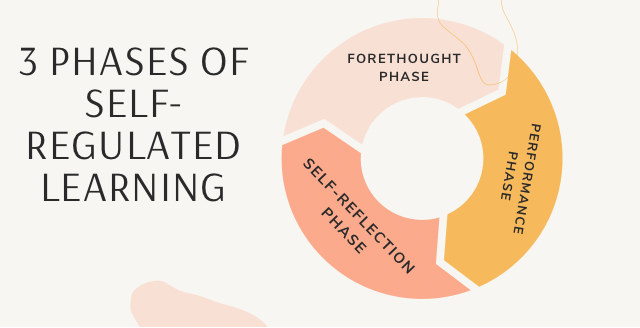3 Phases Of Self-Regulated Learning For Expertise

Self regulation is a self-directive process by which learners transform their mental abilities into academic skills. If you read just one post on how to learn something, it should be this post. People who use self regulated learning viewed it as an exercise that students perform for themselves in a proactive manner rather than a process imposed on them by external system. They are proactive in their attempts to learn because they are aware of their strengths and limitations. They are guided by personal targets, remain motivated to reach it, and accept responsibility for their own learning. This provides them with superior optimism and the ability to adapt different learning methods. It is so effective that studies have correlated self regulation to development of expertise. Unfortunately, unlike a century ago, students today cannot acquire this mindset. This may be because of the sway of modern education, which does not teach students how to develop self regulated learning methods. So, this post will summaries the 3 steps to self regulated learning that will help you adopt your own self regulated learning strategy.
Forethought Phase:

This is the phase in which you set a goal and prepare strategies to reach the goal. It’s also the phase where you motivate yourself to attain your goal. Let’s see how this is done.
There is ample evidence to show that people learn more efficiently when they set specific proximate goals for them self. For example, if you are in the habit of reviewing flashcards, set a goal for yourself that you will review a particular number of flash cards on a particular day. Then you need to find a strategy that will help you reach that goal. For this, you may come up with a time management system like pomodoro technique. The idea is to set up a specific period (either 25 min or 45 min) during which you will study and then take a break for a short while (either 5 min or 15 min). The goal and strategy need not be limited to flashcards. You can set a goal to read one chapter of a book or to study a particular number of concepts. Remember to form your strategy keeping in mind your strengths and weaknesses. Don’t allot too much time to a particular task and don’t overestimate yourself and allot too little time. While forming your goal and strategising, don’t forget motivation, which is a corresponding part of this phase.
Motivation stems from many concepts, one of which is your belief in your own ability to handle the situation. If you set a goal to read one chapter but don’t believe you can do it, you will be less motivated to do the task and less likely to self regulate your learning. Another important factor is what outcome you are expecting from your actions. Its important to have an intrinsic motivation rather than an extrinsic one. If the reason you are learning is to please your family members, your motivation is going to be weaker and not long lasting. On the other hand, if you are learning purely because you value the knowledge or skill, you are more likely to be strongly motivated to complete the task. In fact, learning something for the sake of mastery is considered to be one of the greatest source of motivation. Try to think about why you wish to learn a topic/skill, and try to think of it from the point of view of you as an autonomous, independent person. Exclude the influence of outside systems to find your own reason to learn something.
Once you have your strategy and sufficient motivation, it’s time to move on to the next phase.
Performance Phase:

This phase falls into two major classes: self-control and self-observation. Self-control is about implementing the strategies that you came up with in the previous phase. There are many methods to do this. You could move your study location to a place with fewer distractions or ask your family/friends not to disturb you for the specific time. Another interesting technique for self-control is self talk. This is an idea talked about a lot by SEALFIT founder Mark Divine and motivational speakers like David Goggins. Mark Divines version of it requires you to “feed the courage wolf and starve the fear wolf” by constantly telling yourself that you can achieve the goal and not to give up. David Goggins refer to this as the cookie jar method. In this method, you look at your past achievements and tell yourself that you can do the task before you. The idea in both cases is to dismiss the negative thoughts in your mind that tempts you to be lazy and reinforce it with positive ideas.
The second part of this phase is self-observation. This part is about monitoring yourself and conducting experiments to gain efficiency. For example, if you set a time frame of 45 minutes to study, you can take note of the how many times you get distracted using a tally counter or you can set a timer to see how long you actually study rather than spent time on your phone or something else. You can then theorise the reason for your distraction and perform an experiment to see if you can reduce the time wasted or reduce the number of times you got distracted. For example, if you find that the reason you get distracted is your phone, you can keep your phone in a different location for the 45 minutes and see if that reduces your distractions. If it does not, the cause of your distraction may be something else. Maybe you lack motivation and need to try breaking up the content into smaller chunks that can be managed with your level of motivation. Try to figure out what works for you.
Once that is done, it’s time to consider the final phase.
Self-reflection phase:

The two parts of self-reflection are self-judgement and self-reaction.
Self-judgement is literally your judgement about yourself after training. To determine this, you can use a particular standard, like comparing yourself to your performance in the past or comparing yourself to an ideal and appropriate standard of performance. Some people may also compare themselves to other people. This is not advisable because it may cause a defensive reaction in your mind; i.e., you may convince yourself that you have to be born talented to achieve it, and may prematurely give up on the task. There are other methods of self-judgement like looking for the causal attributions. You can try to find out what elements are causing your success or failures and work on them. Either ways, regardless of the methods you use, it’s important that you try to understand how much you have improved and how you can improve further. This leads us to self- reaction.
Self-reaction is about feeling positive regarding one’s performance. If you are satisfied with your performance, you are more likely to be motivated for the next forethought phase. Its important to adopt a mindset of using your self-judgement to further improve your strategy and disregard useless learning methods. If the 45 min study schedule does not suit you, maybe next time try a shorter period or a longer period based on your preference. Its very important at this phase to not have a defensive reaction by withdrawing from learning something because of fear of failure. Understand that failures and mistakes are a part of learning. Just because you failed once does not mean you can never learn that topic. Instead, see it as an opportunity to come up with a new strategy to handle the task.
Conclusion:
Those are the 3 phases of self regulated learning that you must consider while learning something. People who successfully go through the phases show self-awareness, self-motivation, and behavioral skill to implement their knowledge appropriately. There are plenty of resources available the can help you in each phase. There are plenty of apps that help you set goals and plan your day. Some devices even have in-build planners (check to see if your devices has one). As for the second phase, Mark Devines book Unbeatable Mind: Forge Resiliency and Mental Toughness would be a helpful read. Furthermore, MIT offers free advice and tracking sheets that will help you track and manage your time. As for the self-reflection stage, try keeping a journal of your daily performance. It will help your motivation when you look at it in the future and realise how much you have improved. An important thing to remember is that growth is always possible as long as you don’t give up. Stay positive and find a better method. Remember that these 3 phases are a cycle. If you have a defensive reaction to a task, it will affect your motivation for the next forethought phase. In fact, giving up is like feeding the “fear wolf”. It keeps getting stronger until you are less and less motivated to do any task. Fight that urge and become an expert in your field.
Related Posts
Reading for Comprehension
Have you ever gone through a difficult reading and realised that you grasped nothing? I…
January 13, 2022Case Study Learning : Ditch the Textbook
In our quest to look for more and more efficient study strategies, today’s…
June 7, 2021


Leave A Comment